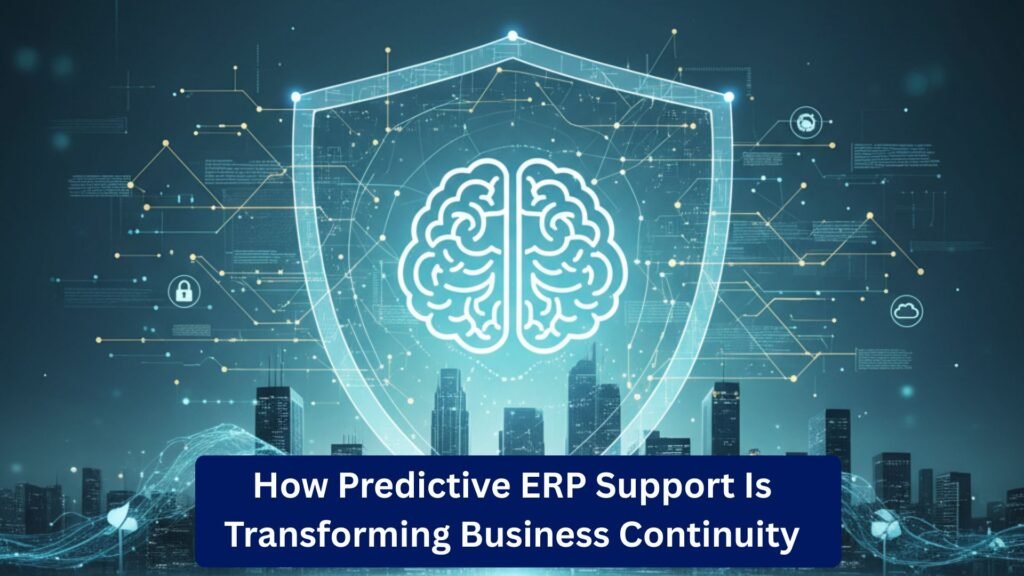In today’s data-driven world, businesses cannot afford unexpected downtime, performance bottlenecks, or system failures—especially when their operations rely heavily on Enterprise Resource Planning (ERP) systems. Whether managing finances, inventory, customer relationships, or supply chain processes, modern enterprises depend on ERP solutions to maintain efficiency and profitability.
But what happens when an ERP system slows down, crashes, or becomes vulnerable to disruptions? For years, companies relied on reactive and preventive support models—fixing issues after they occurred or performing routine maintenance to avoid them. However, the rise of artificial intelligence (AI), machine learning (ML), and data analytics has paved the way for a smarter approach — Predictive ERP Support.
This next-generation support model doesn’t just monitor systems; it predicts issues before they occur, ensuring business continuity, performance stability, and operational resilience. Let’s explore how predictive ERP support is revolutionizing the way organizations maintain uptime, reduce costs, and secure their digital future.
1. What Is Predictive ERP Support?
Predictive ERP support is an AI-driven support model that uses data analytics, automation, and machine learning to identify potential system issues before they affect business operations.
Unlike traditional ERP support models, predictive support continuously collects and analyzes performance data from ERP systems—tracking everything from server health and transaction patterns to user activities and integration logs.
By spotting trends and anomalies early, it can automatically alert support teams or trigger self-healing mechanisms to resolve problems proactively.
In essence, predictive ERP support shifts the paradigm from reactive troubleshooting to preventive intelligence — ensuring maximum uptime and seamless operations.
2. The Evolution: From Reactive to Predictive ERP Support
To understand the value of predictive ERP support, let’s briefly look at the journey of ERP system maintenance over time.
a. Reactive Support
Reactive support is the oldest model, often described as a “break-fix” approach. The support team steps in only when an issue occurs—for example, a system crash or data error. While effective for minor problems, this model often leads to downtime, data loss, and user frustration.
b. Preventive Support
Preventive support introduced regular system checkups and scheduled maintenance. It’s better than reactive support but still relies heavily on human intervention and doesn’t always detect hidden risks.
c. Predictive Support
Predictive ERP support takes it a step further. It uses AI, real-time analytics, and automation to predict system anomalies, detect performance degradation, and mitigate risks before they disrupt operations.
This transition marks a significant leap toward self-healing ERP ecosystems, where systems not only identify but also fix issues autonomously.
3. How Predictive ERP Support Works
Predictive ERP support combines data science, monitoring tools, and intelligent automation. Here’s how it functions step-by-step:
Step 1: Data Collection
The system continuously gathers performance data from various sources—ERP modules, servers, databases, and integrations.
Step 2: Data Analysis
AI algorithms analyze the data to detect abnormal patterns or behaviors, such as slow response times, increased memory usage, or failed transactions.
Step 3: Predictive Modeling
Machine learning models use historical data to predict when a specific issue might occur—for instance, forecasting a database overload or a potential integration error.
Step 4: Alerting and Automation
Once a risk is detected, the system automatically sends alerts to support teams or triggers automated corrective actions (like rebooting services or reallocating resources).
Step 5: Continuous Learning
Over time, predictive support systems learn and improve, refining their accuracy and making future predictions more reliable.
This process ensures 24/7 proactive monitoring and a continuous feedback loop for optimization.
4. Key Benefits of Predictive ERP Support
a. Reduced Downtime
By predicting and preventing issues before they occur, organizations experience fewer outages and disruptions. This ensures uninterrupted business operations and improved customer satisfaction.
b. Faster Problem Resolution
Automation enables immediate action when anomalies are detected, drastically reducing the mean time to repair (MTTR).
c. Cost Efficiency
Predictive support minimizes emergency maintenance costs and resource wastage. Businesses save significantly on unplanned downtime and post-failure recovery.
d. Enhanced System Performance
Continuous monitoring ensures ERP systems run optimally, maintaining performance across finance, sales, supply chain, and HR modules.
e. Improved Business Continuity
Since predictive support ensures ERP systems remain operational around the clock, it strengthens business continuity and resilience against disruptions.
f. Data-Driven Decision Making
Support teams can analyze predictive insights to identify recurring problems, plan upgrades strategically, and optimize infrastructure usage.
5. The Role of AI and Machine Learning in Predictive ERP Support
Artificial Intelligence (AI) and Machine Learning (ML) are the core technologies driving predictive ERP support.
Here’s how they help:
a. Anomaly Detection
AI algorithms analyze millions of data points to identify patterns that deviate from the norm—such as a sudden drop in processing speed or increased API latency.
b. Predictive Maintenance
Machine learning models forecast potential failures in hardware, network, or software components, allowing IT teams to intervene before damage occurs.
c. Root Cause Analysis
AI automates the identification of the root cause of issues, reducing manual investigation time.
d. Intelligent Automation
AI-powered bots can automatically perform repetitive support tasks—like restarting services or clearing temporary caches—without human intervention.
Together, these technologies enable self-sustaining ERP ecosystems that continuously optimize performance while ensuring security and stability.
6. Predictive ERP Support and Business Continuity
Business continuity refers to a company’s ability to maintain essential functions during and after a disruption.
Predictive ERP support directly contributes to this by:
- Ensuring high availability of mission-critical ERP applications.
- Preventing data loss with automated backup and recovery mechanisms.
- Enabling faster disaster recovery through predictive diagnostics.
- Maintaining compliance by proactively managing system configurations and security protocols.
In industries like retail, manufacturing, finance, and healthcare—where even an hour of downtime can cause huge financial losses—predictive support is becoming the backbone of continuity planning.
7. Predictive ERP Support in Microsoft Dynamics 365
Microsoft Dynamics 365 is one of the most advanced ERP ecosystems supporting predictive intelligence.
It integrates seamlessly with Microsoft Azure, Power Platform, and AI services to provide end-to-end predictive support and insights.
Key Predictive Features in Dynamics 365:
- Azure Monitor & Application Insights: For real-time performance tracking and anomaly detection.
- AI Builder & Power Automate: For automating corrective workflows and alerts.
- Predictive Analytics Dashboards: Offering visual insights into potential risks and trends.
- Lifecycle Services (LCS): Assisting with environment monitoring, issue tracking, and proactive diagnostics.
Organizations using Microsoft Dynamics 365 ERP benefit from embedded predictive algorithms that anticipate system slowdowns, security risks, and integration failures — enabling proactive management and greater business continuity.
8. Industry Applications of Predictive ERP Support
a. Manufacturing
Predictive ERP support detects potential bottlenecks in production schedules, monitors machine health, and ensures supply chain reliability.
b. Retail
Retailers can prevent POS system failures, manage seasonal load efficiently, and ensure continuous sales operations.
c. Healthcare
Predictive analytics maintain uptime for patient record systems, avoiding life-impacting data delays or system crashes.
d. Finance
Banks and financial institutions benefit from predictive risk assessments and uninterrupted transaction processing.
Predictive ERP support is industry-agnostic but mission-critical across all sectors that depend on real-time data and system uptime.
9. Implementing Predictive ERP Support: Best Practices
Adopting predictive ERP support requires both technology and process alignment. Here are best practices to follow:
a. Leverage AI-Integrated ERP Systems
Use AI-ready platforms like Microsoft Dynamics 365, which natively support predictive analytics and cloud-based automation.
b. Partner with Experts
Engage a certified ERP support provider like Trident Information Systems, which specializes in implementing predictive and managed ERP support services.
c. Define Key Metrics
Track KPIs like system uptime, MTTR, and performance latency to measure support effectiveness.
d. Automate Incident Response
Integrate ERP with automation tools to trigger alerts, backup data, or restart services automatically during anomalies.
e. Ensure Continuous Learning
Update predictive models regularly with new data to improve accuracy and reduce false positives.
10. The Role of Managed Services in Predictive ERP Support
Managed service providers (MSPs) play a crucial role in enabling predictive ERP support by combining technology expertise with 24/7 monitoring and AI integration.
For example, Trident Information Systems offers:
- Proactive system monitoring using predictive tools.
- Real-time health checks across ERP environments.
- AI-based automation for faster incident resolution.
- Strategic analytics to guide long-term ERP optimization.
By outsourcing predictive ERP support to experts, businesses gain access to specialized skills and continuous innovation—while focusing on core operations.
11. Future Trends: Where Predictive ERP Support Is Heading
The evolution of predictive ERP support is far from over. Emerging trends include:
- Self-Healing Systems: ERP environments that autonomously fix configuration and performance issues.
- Hyperautomation: AI and robotic process automation (RPA) integration for advanced support automation.
- Cognitive Analytics: Context-aware analysis that learns from business behaviors and user intent.
- Predictive Cybersecurity: Early detection of potential breaches through AI-driven behavioral analytics.
- Quantum Computing: Future ERP systems will leverage quantum technology for ultra-fast predictive modeling.
These innovations will make ERP systems more intelligent, adaptive, and resilient—transforming business continuity into a fully autonomous function.
12. Real-World Example: How Predictive ERP Support Ensures Continuity
A large distribution company running Microsoft Dynamics 365 Business Central faced frequent system slowdowns during high-traffic sales periods.
By implementing predictive ERP support through AI monitoring and automated scaling, the company:
- Achieved 99.98% uptime year-round.
- Reduced support tickets by 65%.
- Improved user satisfaction and productivity.
This proactive approach not only optimized system performance but also safeguarded operations during peak demand—ensuring uninterrupted business continuity.
Conclusion
As businesses embrace digital transformation, the dependency on ERP systems continues to grow. But with complexity comes vulnerability — and traditional support models can no longer guarantee seamless operations.
Predictive ERP support is redefining how organizations maintain business continuity. By combining AI, machine learning, and automation, it empowers enterprises to foresee issues, act proactively, and stay operational 24/7.
For companies using platforms like Microsoft Dynamics 365, predictive support offers a strategic advantage—enabling smarter decisions, lower costs, and stronger resilience.
By partnering with experts like Trident Information Systems, businesses can implement predictive ERP support frameworks that turn potential disruptions into opportunities for continuous improvement and growth.
FAQs
Q 1. What is predictive ERP support?
Ans: Predictive ERP support uses AI and analytics to monitor and forecast system issues before they impact operations. It proactively prevents downtime and maintains system efficiency.
Q 2. How does predictive ERP support ensure business continuity?
Ans: By continuously analyzing ERP performance data, predictive support identifies risks early and triggers automated responses, ensuring uninterrupted business operations.
Q 3. What technologies power predictive ERP support?
Ans: Predictive ERP support relies on AI, machine learning, cloud analytics, and automation to forecast, detect, and mitigate potential system issues.
Q 4. Is predictive ERP support suitable for all industries?
Ans: Yes, industries like manufacturing, retail, healthcare, finance, and logistics can all benefit from predictive ERP support to maintain uptime and optimize processes.
Q 5. How is predictive support integrated into Microsoft Dynamics 365?
Ans: Dynamics 365 uses Azure Monitor, AI Builder, and Lifecycle Services to deliver predictive insights, automated monitoring, and self-healing capabilities.
Q 6. What are the main benefits of predictive ERP support?
Ans: Reduced downtime, lower maintenance costs, faster response times, and improved business continuity are the primary advantages.
Q 7. Can predictive ERP support work with cloud and on-premise systems?
Ans: Yes. Predictive models can monitor both cloud-based and hybrid ERP environments to ensure end-to-end reliability.
8. How can Trident Information Systems help with predictive ERP support?
Q 8. How can Trident Information Systems help with predictive ERP support?
Ans: Trident offers AI-integrated ERP managed services, proactive monitoring, and continuous system optimization — ensuring your business runs securely and efficiently.



